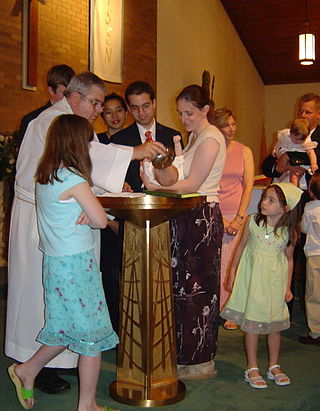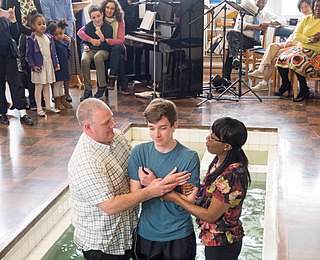Related Research Articles

Baptism is a Christian sacrament of initiation almost invariably with the use of water. It may be performed by sprinkling or pouring water on the head, or by immersing in water either partially or completely, traditionally three times, once for each person of the Trinity. The synoptic gospels recount that John the Baptist baptised Jesus. Baptism is considered a sacrament in most churches, and as an ordinance in others. Baptism according to the Trinitarian formula, which is done in most mainstream Christian denominations, is seen as being a basis for Christian ecumenism, the concept of unity amongst Christians. Baptism is also called christening, although some reserve the word "christening" for the baptism of infants. In certain Christian denominations, such as the Catholic Churches, Eastern Orthodox Churches, Oriental Orthodox Churches, Assyrian Church of the East, and Lutheran Churches, baptism is the door to church membership, with candidates taking baptismal vows. It has also given its name to the Baptist churches and denominations.
To be born again, or to experience the new birth, is a phrase, particularly in evangelical Christianity, that refers to a "spiritual rebirth", or a regeneration of the human spirit. In contrast to one's physical birth, being "born again" is distinctly and separately caused by the operation of the Holy Spirit, and it occurs when one surrenders their life to Christ. While all Christians are familiar with the concept from the Bible, it is a core doctrine of the denominations of the Anabaptist, Moravian, Methodist, Baptist, Plymouth Brethren and Pentecostal churches along with evangelical Christian denominations. These Churches stress Jesus's words in the Gospels: "You must be born again before you can see, or enter, the Kingdom of Heaven". Their doctrines also hold that to be "born again" and thus "saved", one must have a personal and intimate relationship with Jesus Christ.

In Catholic theology, Limbo is the afterlife condition of those who die in original sin without being assigned to the Hell of the Damned. However, it has become the general term to refer to nothing between time and space in general. Medieval theologians of Western Europe described the underworld as divided into three distinct parts: Hell of the Damned, Limbo of the Fathers or Patriarchs, and Limbo of the Infants. The Limbo of the Fathers is an official doctrine of the Catholic Church, but the Limbo of the Infants is not. The concept of Limbo comes from the idea that, in the case of Limbo of the Fathers, good people were not able to achieve heaven just because they were born before the birth of Jesus Christ. This is also true for Limbo of the Infants in that simply because a child died before baptism, does not mean they deserve punishment, though they cannot achieve salvation.

Infant baptism is the practice of baptizing infants or young children. Infant baptism is also called christening by some faith traditions.

In Christian denominations that practice infant baptism, confirmation is seen as the sealing of the covenant created in baptism. Those being confirmed are known as confirmands. For adults, it is an affirmation of belief. The ceremony typically involves laying on of hands.
The five solae of the Protestant Reformation are a foundational set of Christian theological principles held by theologians and clergy to be central to the doctrines of justification and salvation as taught by the Lutheranism, Reformed and Evangelical branches of Protestantism, as well as in some branches of Baptist and Pentecostalism. Each sola represents a key belief in these Protestant traditions that is distinct from the theological doctrine of the Catholic Church, although they were not assembled as a theological unit until the 20th century. The Reformers are known to have only stated two of the five solae clearly. Even today there are differences as to what constitutes the solae, how many there are, and how to interpret them to reflect the Reformers' beliefs.

In Christianity, salvation is the saving of human beings from sin and its consequences—which include death and separation from God—by Christ's death and resurrection, and the justification entailed by this salvation.

Covenant theology is a biblical theology, a conceptual overview and interpretive framework for understanding the overall structure of the Bible. It is often distinguished from dispensational theology, a competing form of biblical theology. It uses the theological concept of a covenant as an organizing principle for Christian theology. The standard form of covenant theology views the history of God's dealings with mankind, from Creation to Fall to Redemption to Consummation, under the framework of three overarching theological covenants: those of redemption, of works, and of grace.
The means of grace in Christian theology are those things through which God gives grace. Just what this grace entails is interpreted in various ways: generally speaking, some see it as God blessing humankind so as to sustain and empower the Christian life; others see it as forgiveness, life, and salvation.

Infant communion, also known as paedocommunion, refers to the practice of giving the Eucharist, often in the form of consecrated wine mingled with consecrated bread, to young children. This practice is standard throughout Eastern Christianity, where communion is given at the Divine Liturgy to all baptized and chrismated church members regardless of age. Infant communion is less common in most of Western Christianity.
The fate of the unlearned, also known as the destiny of the unevangelized, is an eschatological question about the ultimate destiny of people who have not been exposed to a particular theology or doctrine and thus have no opportunity to embrace it. The question is whether those who never hear of requirements issued through divine revelations will be punished for failure to abide by those requirements.
The Federal Vision is a Reformed evangelical theological approach that focuses on covenant theology, Trinitarian thinking, the sacraments of baptism and communion, biblical theology and typology, justification, and postmillennialism. A controversy arose in Reformed and Presbyterian circles in response to views expressed at a 2002 conference entitled The Federal Vision: An Examination of Reformed Covenantalism. The ongoing controversy involves several Reformed denominations including the Orthodox Presbyterian Church (OPC), the Presbyterian Church in America (PCA), the United Reformed Churches in North America (URCNA), and the Reformed Presbyterian Church in the United States (RPCUS), and the Protestant Reformed Churches in America (PRCA).
Regeneration, while sometimes perceived to be a step in the ordo salutis, is generally understood in Christian theology to be the objective work of God in a believer's life. Spiritually, it means that God brings a person to new life from a previous state of separation from God and subjection to the decay of death. Thus, in Lutheran and Roman Catholic theology, it generally means that which takes place during baptism. In Calvinism and Arminian theology, baptism is recognized as an outward sign of an inward reality which is to follow regeneration as a sign of obedience to the New Testament; as such, the Methodist Churches teach that regeneration occurs during the new birth.
Baptismal regeneration is the name given to doctrines held by the Catholic, Eastern Orthodox, Oriental Orthodox, Lutheran, Anglican churches, and other Protestant denominations which maintain that salvation is intimately linked to the act of baptism, without necessarily holding that salvation is impossible apart from it. Etymologically, the term means "being born again" "through baptism" (baptismal). Etymology concerns the origins and root meanings of words, but these "continually change their meaning, ... sometimes moving out of any recognisable contact with their origin ... It is nowadays generally agreed that current usage determines meaning." While for Reformed theologian Louis Berkhof, "regeneration" and "new birth" are synonymous, Herbert Lockyer treats the two terms as different in meaning in one publication, but in another states that baptism signifies regeneration.
Rebaptism in Christianity is the baptism of a person who has previously been baptized, usually in association with a denomination that does not recognize the validity of the previous baptism. When a denomination rebaptizes members of another denomination, it is a sign of significant differences in theology. Churches that practice exclusive believer's baptism, including Baptists and Churches of Christ, rebaptize those who were baptized as infants because they do not consider infant baptism to be valid. However, churches from such denominations deny that they rebaptize because they do not recognize infant baptism as baptism at all.

Wesleyan theology, otherwise known as Wesleyan–Arminian theology, or Methodist theology, is a theological tradition in Protestant Christianity based upon the ministry of the 18th-century evangelical reformer brothers John Wesley and Charles Wesley. More broadly it refers to the theological system inferred from the various sermons, theological treatises, letters, journals, diaries, hymns, and other spiritual writings of the Wesleys and their contemporary coadjutors such as John William Fletcher, Methodism's systematic theologian.

Believer's baptism or adult baptism is the practice of baptizing those who are able to make a conscious profession of faith, as contrasted to the practice of baptizing infants. Credobaptists believe that infants incapable of consciously believing should not be baptized.
Sola gratia, meaning by grace alone, is one of the five solae and consists in the belief that salvation comes by divine grace or "unmerited favor" only, not as something earned or deserved by the sinner. It is a Christian theological doctrine held by some Protestant Christian denominations, in particular the Lutheran and Reformed traditions of Protestantism, propounded to summarise the Protestant Reformers' basic soteriology during the Reformation. In addition, salvation by grace is taught by the Catholic Church: "By the grace of God, we are saved through our faith; this faith entails by its very nature, good works, always enabled by prior grace, without which this faith is dead."
Protestant theology refers to the doctrines held by various Protestant traditions, which share some things in common but differ in others. In general, Protestant theology, as a subset of Christian theology, holds to faith in the Christian Bible, the Holy Trinity, salvation, sanctification, charity, evangelism, and the four last things.

In Christian theology, the salvation of infants has been a matter of speculation and diverse opinions. While some believe that all those who die in infancy are saved, others believe that people only have certainty regarding some of these infants.
References
- ↑ Hooker, Ashley (26 January 2022). "What Is the Age of Accountability?". Crosswalk.com . Retrieved 2 November 2023.
- 1 2 MacArthur, John. "The Age of Accountability". Grace To You. Retrieved 2 November 2023.
- ↑ Code of Canon Law, can. 97 §2
- ↑ Schouppe, François Xavier (1879). Abridged Course of Religious Instruction, Apologetic, Dogmatic, and Moral: For the Use of Catholic Colleges and Schools. Burns & Oates. p. 351.
- ↑ Duncan, Ligon (5 May 2020). "Is there an age of accountability?". Reformed Theological Seminary . Retrieved 2 November 2023.
- 1 2 "What We Believe". Congregational Methodist Church . 2023. Retrieved 27 January 2024.
- 1 2 Wills, Ben. "Baptism: A Scriptural Explanation to Common Questions". Marvin United Methodist Church.
- ↑ "What We Believe". Congregational Methodist Church . 2023. Retrieved 27 January 2024.
Since children are born into this world with natures inclined to sin, and yet the prevenient grace of God provides for their redemption during that time before the age of accountability, parents are encouraged to testify to their faith in God's provision by presenting their infant children, according to their conscience, for dedication or baptism. When any person, baptized as an infant, comes to personal faith in Christ he or she is encouraged to confirm that baptism by public testimony.
- ↑ "Primary 3 Manual: Lesson 27: The Age of Accountability". The Church of Jesus Christ of Latter-Day Saints . Retrieved 2 November 2023.
- ↑ Wellum, Stephen (1 October 2018). "Does the Bible Teach an Age of Accountability?". The Gospel Coalition . Retrieved 2 November 2023. Emphasis original.